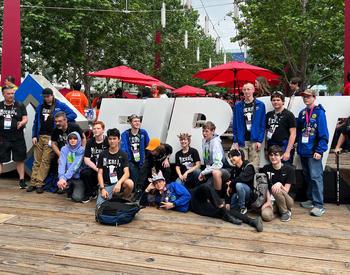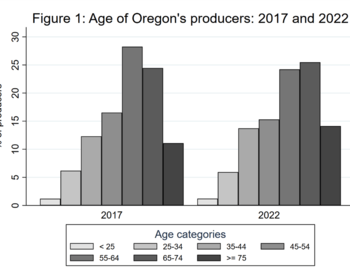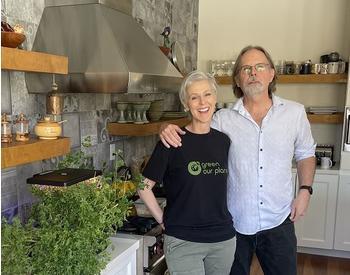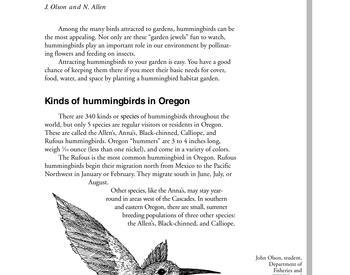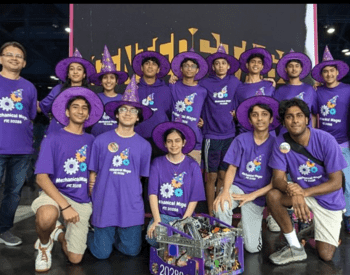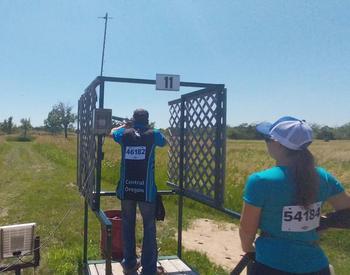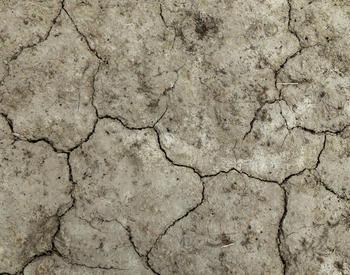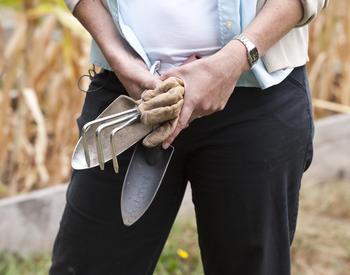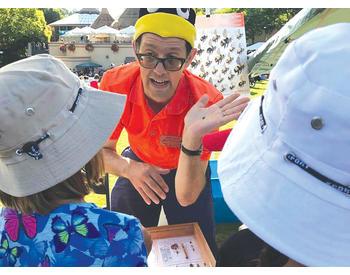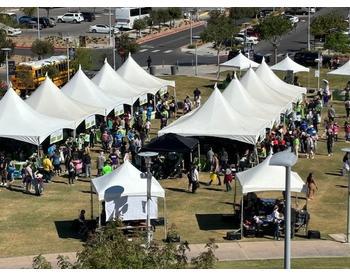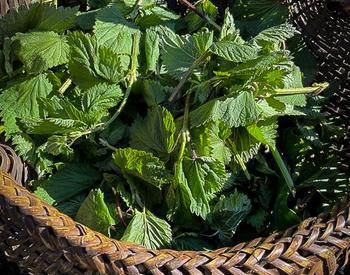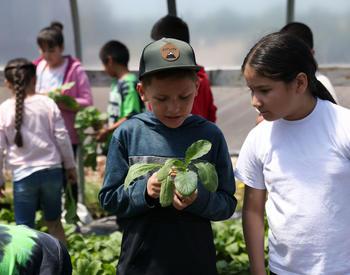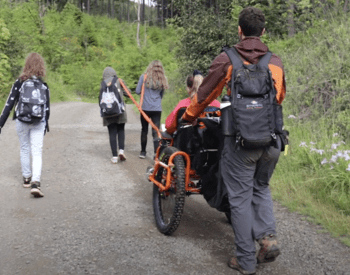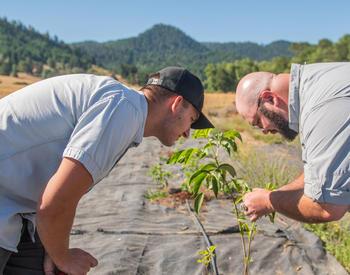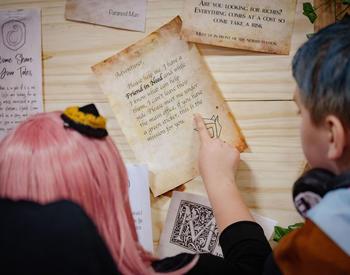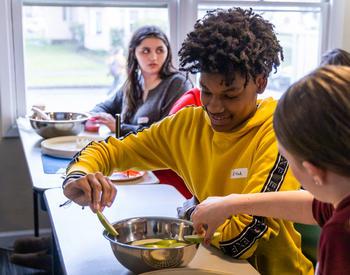Transcript
00:00:05 Michelle
Welcome to the farm to school podcast where you will hear stories of how you thrive and farmers prosper when we grow, cook and eat delicious, nutritious local foods and schools across the country and the world.
00:00:17 Rick
We're your hosts. I'm Rick Sherman
00:00:18 Michelle
And I'm Michelle Markesteyn
00:00:20 Rick
OK. So thank you everybody for coming. And today we're going all the way. Well, halfway across the country to College Station, TX to Texas A&M University and we're going to talk to our good friend Randy Seagraves with Texas A&M. Now, Randy, you are you do you live in College Station?
00:00:31 Michelle
Hey. Hi, Randy.
00:00:39 Randy Seagraves
Hey, guys. We are a Texas A&M it’s the land grant University, so there's several satellite campuses throughout our state, but our flagship, the home campus is here in College Station.
00:00:54 Rick
OK. All right, good deal. And Randy, what is it that you do there at Texas A&M University?
00:01:02 Randy Seagraves
Well, my job specifically with Junior Master Gardener is serving as the curriculum coordinator and I always have to admit to people. My background is not horticulture, but it's the education side of that fence. So my background specifically before jumping into this junior master gardener extension well, was teaching third graders at a public school here in College Station.
00:01:13 Rick
OK. And yeah. So, junior, master gardener now is that an are you the, is that the head of the nationwide program then for the country?
00:01:35 Randy Seagraves
It's grown. It's a bit different than what you see with the Master Gardener program. The Master gardener world. For folks who are familiar with master Gardeners, those programs each have autonomy. You know, at the state level. And they create their own programming curriculum. They have different mandates of how they have individuals go through and be taught and contribute service back to the agency to have that. But what's different about junior master gardener is we manage that program office, the National Program Office and now an international program with some of our partners that we have and we have folks that serve as state level coordinators and 38 states across the country, so far.
00:02:09 Rick
OK. Thirty well, 38 states. I'm glad you said that. That was going to be my next question was how many states have it? So 38 so… not in all 50 as, as we speak so much, but…
00:02:21 Randy Seagraves
We have partnerships and leaderships where we have those, those agencies in those 38 states have program partnerships with us. But as far as having groups and operation, we do have junior master gardener groups and classes that are operating in all 50 States and in addition four countries across our great planet as well.
00:02:40 Rick
So and junior master gardener and I'm glad you did the segue and made the differentiation between a regular master gardener, which I am one. So that was that was a process to do that. And I did it online in my state back in 2011. So what is the age group? Junior master gardener targets?
00:03:05 Randy Seagraves
Well, and I'm glad you came back to the master gardener as a starting point starting point because the master Gardener program really is our model and junior master gardener is the kid version of the Master Gardener program and as you know Rick, have you gone through the program back in 2011 you said there is a process where you got trained and used. Those trainings happen in the local extension office. There is some type of a formula that you have to give service hours back to your state or your county level extension agency and those are approved and that combination of training and service hours is what awards those adults and master gardener certification. So it's very similar in the junior Master gardener world. This truly is the kid version of that. So instead of somebody a kid coming to an extension office.
00:03:30 Rick
Yes.
00:03:48 Randy Seagraves
Typically, about 3/4 of our groups operate as classes, and those teachers service as the leaders using junior master gardener curriculum. There's one more jumping point of them having this foundation of leadership, skill, life, skill development that's included within our program, but then we do go back to the service learning and leadership component as well. And once kids have all of those components, they can earn a full-fledged certification as a junior master gardener or one of the other recognition certifications built into the curriculum.
00:04:17 Rick
Yeah, that I imagine that as such, I know how I felt all this pride when I was able to say I'm a master gardener. So for a kid to say that too.
00:04:27 Rick
And I don't think we got there, but as I seem to remember is it like fifth grade at that level, is that what you target?
00:04:33 Randy Seagraves
It ranges and you'll have to corner me right, cuz I'll get on tangent sometime and then I'll have to be brought back to the question. But the answer question our program started and what's crazy about this, we've been in this business for a while. And you’re in the same boat. But junior master gardener is about to celebrate its 25th anniversary. And when we first began geared towards this level one junior master gardener level one, which was specifically geared towards a 3rd through 5th grade range of kids.
00:05:02 Rick
Right.
00:05:03 Randy Seagraves
And that was initially established because as you're working on curriculum development, anybody who does that kind of work, there's correlations. You have to have in place national level and state level correlations, alignments and standards and such. Those correlations happen. But you know what happens with teachers? Rick, if there's some kind of curriculum effort that's in place. So that's good. Teachers will use it and potentially you know, adapted up and down depending on the age of the kid, but specifically it was geared towards that 3rd through 5th grade range of kids, so that's the bulk of our audience. We have several different curriculum publications that are for that range, but we also have two publications that are teacher guides for middle school junior high Kids. So that's a 6th or 8th grade range, but then we started backing up a bit and we last year had the first release. Our first early childhood curriculum that really specifically geared towards a pre-K kinder and really a super narrow range a targeting towards four and five year olds.
00:05:48 Michelle
Wow.
00:05:55 Rick
I didn't know that, and so I know this is this is a large question saying that you went through that whole range of pre-K all the way to middle school now junior high. But what are some of the typical things, these grade these ranges of kids learn in JMG?
00:06:17 Randy Seagraves
Well, it's all over the place. So one thing, I'll just kind of share with anybody who's done teacher kind of work. There's lots of curriculum that's out there that will literally say the target audience is first grade through 8th grade and that's a pretty wide range. You know guys before we're talking about trying to serve an audience. So trying to make it look more narrow to be developmentally pro for the kid that we're working on, but it kind of depends. The initial curriculum that we had in place, the junior master gardener, teacher, Leader guide and there's a youth handbook that goes along with that. It really is comprehensive and that is even modeled after the adult master gardener handbooks, so the comprehensiveness of chapter one being plant growth and development in Chapter 2 soils and water, and Chapter 3, ecology, environmental horticulture and four being insect and plant diseases and so on. So after that, there were some theme based curriculum.
00:06:58 Rick
OK.
00:07:04 Randy Seagraves
One of our earliest ones was wildlife gardener, and that was a partnership with the National Wildlife Federation. So kids who complete that one can earn a certification to become a wildlife gardener, after that was kind of my favorite curriculum, was called Literature in the garden, and it's all these great garden and nutrition and science and social studies lessons that come from some great children's book read aloud that has some kind of a gardening theme to it as well. But the coolest thing is the most recent curriculum that builds around this theme called Learn, Grow, eat and go, and we had some great resources. We had some USDA grants that helped us to develop and research this initial curriculum again, still geared towards that elementary audience, but my gosh, this thing included all these different components of garden education and food exposures and some nutrition science, but also some physical activity coming games and some fantastic research that came from that to show what these benefits really, really, truly are. So because of that successful research, we stepped back and created the starting point of the early childhood curriculum as well. So the early childhood learning growth.
00:08:13 Rick
So it that's interesting. I there's so much of this I didn't know because I wasn't in the junior Master gardener program ever. Nor have I taught it or anything like that. So it sounds like what you're saying is there's a whole bunch of different tracks depending on the age level, the great or what you want to teach. You can go a bunch of different directions then.
00:08:33 Rick
I guess is that correct?
00:08:34 Randy Seagraves
We've done lots of curriculum development work and what we've really learned is going from a starting point of having that very super comprehensive curriculum resource that teachers use. And from that initial teacher leader guide, students can earn that full fledge certification of being a certified junior master gardener. Or there could be smaller bite sized certifications. Students could earn, such as implant growth and development, or in soils and water. That type of thing. But a lot of times working with teachers, they would come up like, well, how long does it take to complete the program? And the answer was well, it depends. It's like, what do you want to do with it? And it was kind of this menu format of how teachers stepped through it. The last two curriculum had been a shift on how we developed content and has been to make it more teacher. And be more linear based. So instead of having 450 total lessons that make out that that teacher guide and the kids handbook in the first volley of curriculum, we now have that elementary learn and grow, eat and go. And there are 10 weeks of lessons, two lessons per week and that is a heck of a lot easier for teachers to be able to tackle and build into their schedule. Linear step by step basis that built on each other as opposed to moving through this wide range of resource making kind of pick and choose what they want to get through it.
00:09:50 Michelle
And you had mentioned research-based evidence based curriculum for learn, grow, eat and go. Can you can you tell us what does that mean?
00:10:01 Randy Seagraves
There was a big part of the of the grant that that we were able to get on doing the research side that from the USDA was spent on research and so there was about a 1600 valley of kids that were that were a part of this research study and in different sites and districts across the state.
00:10:21 Randy Seagraves
Here in, in in Texas and these are Title 1 communities. So we're talking about in the lower economic scale.
00:10:27 Randy Seagraves
From more urban areas to more rural areas and coastal areas all over the place. And so we had research that took place over a few years and it was substantial. And so some of the things we talked about are just getting teacher input and kids responses and marking progress, but also incorporated some of the interviews with parents. And even scales of kids being able to get a weight skeleton by that measure. So there were researchers from the University of Texas that were a part of wiping these elementary kids feet off and having sudden these dexa scanners that were able to be able to analyze the body fat. And so some of the great things about this, I mean, the three of us on this discussion now know about these benefits of gardening. And once you get from it, but we have more data that shows that. It's not just the cool, warm, fuzzy things, so kids exposing them, being exposed to, to gardens and plants, and being able to appreciate more of these vegetables and other benefits they get from being in the gardens. There is little data that shows that these kids body mass index numbers improve from before and after using this curriculum, and that is a huge starting point potentially to jumping up and to get more funds supporting for the development of the program. So separate from those measures, one of the great data points that are really loud because I used to be in this world teaching these eight and nine year olds and 8-9 year olds are great kids, but sometimes they're not always great about followed through and always great about getting papers home to moms and dads. And so one of the great things we saw from the research of this study that happened several years ago was kids were taking their learning to happen in the classroom and having to take place at home. So these food exposures, these recipe demonstrations, we have data that shows that kids are taking these recipes home and kids in these lower income communities even were shopping with their parents to get these groceries and get this produce and producing these recipes together and working in the garden together so that crossover into the home was some of the most exciting data that I've been able to be a part of a project because you're not impacting just that kids life and that kids future, but you're impacting the larger family unit of improving these health practices at home.
00:12:32 Michelle
OK. That's amazing.
00:12:33 Rick
I was. I'm thinking that a teacher like I'm a local teacher and I wanna do junior master gardener. But then two questions up and the first part is like where do I go? That's the one thing to to learn. More to sign up my classroom. Whatever. And the other part is, I'm just guessing that teachers are going to say to me “Ohh my every minute of my class time is taken up for our curriculum. We're already doing. How can I fit junior master gardener into what I'm doing right now?” Can you speak to any like where do I go and yeah.
00:13:07 Randy Seagraves
And yes, my friend. Yes. And in that point, that question of teachers being consumed and everything coming at them and every minute being valuable is probably the biggest thing that we get to respond to. So that initial study that we had done as a part of the original curriculum was great because it incorporated two semesters of content and what we did that from that and the data we got from that was really distill that that two semester curriculum down to this 10 less than 10 weeks, 2 lessons per week. So we're talking about 20 lessons of time and what's great about that is even as teachers that are busy and their schedules are full, if we're able to pull them into a teacher training workshop and they start like this type of a quick something to take part in this hands on experience as a part of a workshop. They're like, wait a minute. My kids would love this. We can make this happen. I can do this. It's kind of the response and then I can do it. Response is what we really live for now. Because sometimes just making these connections and introductions. If some of the districts we work with are so super scheduled and some are that way exactly what you're saying, like literally every minute of every day across the entire district is really umm... firm and some of these districts we worked with, it's because there's some transient populations that go from campus to campus, you know, so if you're teaching, if you're teaching 3rd grade and you do fractions your first month of school, but another teacher on the other side of the district, they may do fractions in the middle of the of the of the school year, right? If they don't match up, some kids will have gaps in their learning. So those kinds of systems are the hardest to kind of get into. But even those systems are ways to get through, but you've got to get an administrative connection and buy in to be able to start making some room for that. And we've got ways we've been able to be successful on that front as well.
00:14:48 Michelle
What's one thing you'd like everyone to know? Put something they can take away from this.
00:14:54 Randy Seagraves
Well, me kind of referring back to the starting point of our conversation here is that we're still new. We've been around for a while, but we're still new and to a lot of people in this youth gardening world. And so we have a staff of four full time people, but we also have a larger staff of people who work at the state and county level to reach our group, so. Here's my challenge for both of you for your listeners. If they are not already familiar with junior master gardener, I would think in great starting point would be the segue to that learn and grow, eat, grow curriculum either for the elementary side or the whole childhood. Because it is very, very easy to follow and what's great about it is it brings in all those components of introducing to kids and the student LED garden project effort of what plants are and why they are important and how we provide for their needs and how they can provide for our needs. So every aspect of them doing garden work to selecting a garden site doing site evaluations to the garden builds to sharing schedules for maintenance. Is built in the student LED components, so over that 10 week period of time there's the basis for a long term sustainable garden project that can be established. So I would my advice is to have them give that learn and grow and go if they're not already familiar with the junior Master Gardener program, have them give that, learn, grow, eat, go curriculum a try and see if they think that's a good fit for their kids and I do see locally here where we're from. I do see those workshops you're talking about, like, hey, try on JMG in your classroom for teacher, teacher workshops or whatever.
And so they worked on trying to do is since that phase of time that we had during this the COVID phase, right where people were learning at a distance is we developed these online learning systems. And for the first year past COVID, we came back together for our annual national leader training. So those people would come to us here in our university town and we would spend a few days with them. It really is developing some all-encompassing knowledge about the program and how to implement and build long term sustainable programs. But what was great about it was the year after that we went back to a virtual format because in our world of extension of trying to reach audiences and trying to keep costs accessible for folks we were able to expand our reach. So each year we've come close to increased by a third or to 50% of our audience because it's virtual. So I'll tell your audience too that the third week of February every year we have our virtual national leader training and they will search the junior Master Gardener webpage, junior Master gardener through Google or JMG kids.US. There will be a header at the top of that during the range of time for the junior Master Gardener national leader training, and in fact we just posted a call for proposals right now. If people interested in checking that out, we'd love to have some other folks be participants.
00:17:45 Michelle
Ohh.
00:17:45 Rick
Great, OK. And I'll sure post a link to that in our show notes as well and that was going to be night. My next question, what's your website and I think you just told me that so I could go there to learn more about Junior master gardener in my state, correct?
00:18:01 Randy Seagraves
Sure, you could search that there is a there is a state coordinator and the Oregon extension is a great partner and some states have larger junior Master Gardeners and the offices and others do, but just check it out with contacts for your state coordinator are going to be there as well and then also checking out to your master gardener on social media. That's a great way to keep up with events and happenings and opportunities than within our program.
00:18:23 Michelle
Thank you, Randy. This is so insightful. Yeah, we're we, we love junior master gardener, so we appreciate it.
00:18:30 Randy Seagraves
Well, we just, I know we're preaching to the choir, but we're preaching to the choir at this audience. But there are so many incredible long term sustainable benefits kids get. And if, if the teachers that these leaders that we're talking to right now are not the ones making introductions, we we're not getting those connections made. So we always tell our teachers that they are the ones who are growing the next generations of gardeners. And people typically have individuals. I remember as being the first person who connected them to gardens and what's happening now is teachers themselves are more likely to be that one because there's fewer and fewer. When I first began with this program, it was because of a connection with our school district. Had a professional development opportunity for teachers, and because I was doing some school gardening programming in my classroom. The school connects you to people, and since we are in a university town, there's all kinds of individuals who happen to be experts in certain areas. And one of the areas I got to be plugged into was a one was a dead chicken composting and it was a soil scientist. And when these facilities are using these animal cruxes, they have a system being able to degrade these systems into soil matter again. And that was one of them. But the one that I've plugged into that I was just on fire about was they connected me to go observe somebody who is teaching horticulture technician program at a women's prison camp. So as a third grade teacher, I went and got background screened and thumbprint fingerprint screening and showed up at this prison camp to meet the instructor who is Lisa Whittlesey. And as we met, we connected and we really hit it off. And what was kind of cool about this connection point at lunch, we talked about what worked with our students, what were successes. We have, what were benefits that we saw. And what was amazing is that those same benefits that I saw with my 8-9 year olds she saw with her adult female offenders, some were for in their young 20s and some were in their in their senior adult years, right. And so this connection point was incredible, and what she was talking about was taking some starting points of Junior master gardener programs that were happening at county levels for years in our state and trying to formalize that to be a program that you can have some kids gardening efforts that they can have because as these kids, these young kids of these female offenders that were her students at this at this prison camp. They were able to come on site periodically, so she wanted to have some things, some programming for those kids and those moms to be able to do. So I said, you know what, whenever you get funding for this program, cuz she was she's a big idea person. Whenever you get funding for this, let me know and we'd love to be a pilot site. I love my classroom, be a pilot side of this junior master gardener program idea. So she calls me. It was about December later that year and she basically calls to offer me a job to be curriculum coordinator. And as you know, people who work in the school world, you don't leave your job at mid year to do something else. So basically, I had to finish out my school year for teaching third grade. I wasn't ready to quit the job as a teacher, but what happened was that they figured out a way for the university to basically give me a sabbatical, and they reimbursed the district my salary for a year. Then we're just doing nothing but curriculum development. So my starting point is not like I said, horticulture. It's the curriculum development side. But we know what works with kids, but I have to say that me and who is now the program coordinator for junior master gardener. We met in a women's prison camp and I always like to use that and whenever a speaking engagement together, that's the opening starting point of how we were in a women's prison.
00:21:55 Rick
It's interesting how life turns out sometimes, isn't it? Wow, that's a great story. Thanks. Thanks for sharing that.
00:22:00 Randy Seagraves
That's right. That's right.
00:22:02 Rick
Yeah, it's so important for kids to know where their food comes from. And this is this could be a very big part of that. So thanks again, Randy. So much for being on the show today.
00:22:15 Michelle
Thanks Randy.
00:22:15 Randy Seagraves
Thank you for inviting me to this space. I appreciate your time and you guys keep up the amazing work.
00:22:19 Michelle
That you're doing. Thank you. You too.
00:22:20 Rick
OK, we'll do that.
00:22:22 Michelle
Farm to school podcast was written, directed and produced by Rick Sherman and Michelle Markesteyn with production support from Leanne Lochner at Oregon State University. Thank you.
00:22:32 Rick
This grant was made possible by a grant by the United States Department of Agriculture. The content and ideas for the farm to school podcast does not necessarily reflect the opinions of Oregon State University, Oregon Department of Education, and the United States Department of Agriculture. The USDA, Oregon Department of Education. The Oregon State University are equal opportunity providers and employers.
00:22:56 Michelle
Do you want to learn more about Farm to school? Check out our other episodes, show notes and our contact information by Googling Up Farm to school podcast, OSU.
00:23:06 Rick
And you'll find a stop by that website that Michelle just talked about. We would love to hear from you. Stop by and say hello or give us an idea for a future podcast.
00:23:10 Michelle
Yeah. Thanks everyone.
00:23:17 Rick
That's it, everybody. Thank you. See you next time.
Join us as we interview Texas A&M University's Randy Seagraves. Randy is the Program Specialist and Curriculum Director of the International Junior Master Gardener Program. Find out how America's youth are inspired and transformed by this wonderful program.
- Junior Master Gardener Curricula/Program Research Findings
- Learn, Grow, Eat & Go!
- Early Childhood
- Call for Presenters for the Virtual 2025 National JMG Leader Training
New curricular resources to reference for your school garden library:
- Learn, Grow, Eat and GO themed curricular resource 1
- Learn, Grow, Eat and GO themed curricular resource 2
- Online courses and resources for teachers
The Farm to School Podcast is produced by Rick Sherman, Farm to Child Nutrition Program Manager at the Oregon Department of Education and Michelle Markesteyn, Farm to School Specialist at Oregon State University Extension with production support from LeAnn Locher, OSU Extension. The show is made possible by a grant from the United States Department of Agriculture.
Want to connect? We’d love to hear from you!
